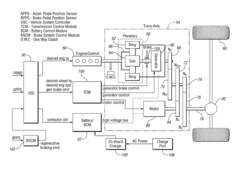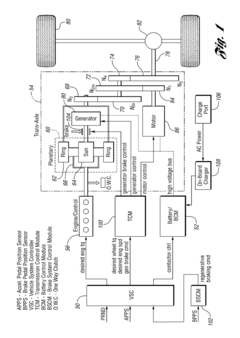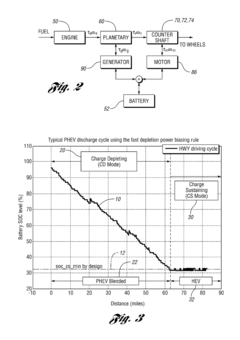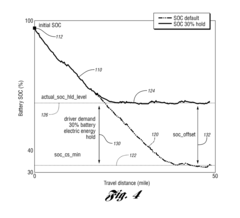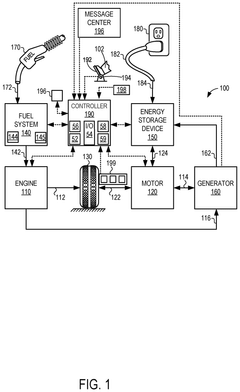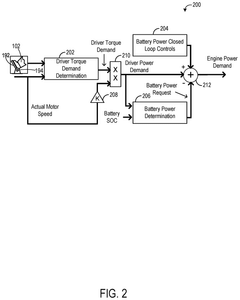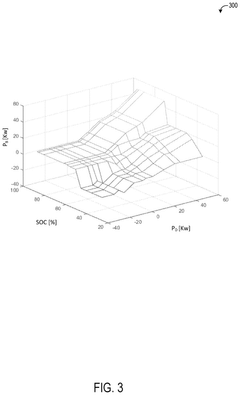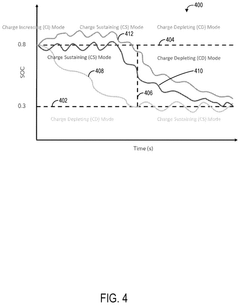Advanced PHEV charging technologies evolution
AUG 14, 202510 MIN READ
Generate Your Research Report Instantly with AI Agent
Patsnap Eureka helps you evaluate technical feasibility & market potential.
PHEV Charging Evolution
The evolution of Plug-in Hybrid Electric Vehicle (PHEV) charging technologies has been a critical factor in the widespread adoption of these eco-friendly vehicles. Over the past decade, significant advancements have been made in charging infrastructure, battery technology, and charging protocols, leading to improved efficiency, convenience, and user experience.
In the early stages of PHEV development, charging was primarily limited to slow, Level 1 charging using standard household outlets. This method, while accessible, was time-consuming and impractical for many users. The introduction of Level 2 charging stations marked a significant milestone, offering faster charging speeds and greater convenience for PHEV owners.
As PHEV technology progressed, the focus shifted towards developing more advanced charging solutions. The implementation of DC fast charging capabilities in PHEVs represented a major leap forward, allowing for rapid charging times and extended electric-only driving ranges. This technology has been particularly beneficial for long-distance travel and has helped alleviate range anxiety among PHEV users.
Wireless charging technology has emerged as another innovative solution in PHEV charging evolution. This contactless charging method offers increased convenience and has the potential to revolutionize the way PHEVs are charged, particularly in urban environments. While still in its early stages of adoption, wireless charging is expected to play a significant role in the future of PHEV charging infrastructure.
Smart charging systems have also become increasingly prevalent in recent years. These intelligent charging solutions optimize charging times based on factors such as electricity rates, grid demand, and user preferences. By leveraging advanced algorithms and connectivity, smart charging systems contribute to more efficient energy management and reduced charging costs for PHEV owners.
The integration of Vehicle-to-Grid (V2G) technology represents another significant development in PHEV charging evolution. This bidirectional charging capability allows PHEVs to not only draw power from the grid but also feed excess energy back, potentially stabilizing the electrical grid during peak demand periods and providing additional value to PHEV owners.
Advancements in battery technology have played a crucial role in the evolution of PHEV charging. Improved energy density, faster charging capabilities, and enhanced thermal management have all contributed to more efficient and reliable charging processes. These developments have led to reduced charging times and increased electric-only driving ranges for PHEVs.
Standardization efforts in charging protocols and connectors have also been instrumental in the evolution of PHEV charging technologies. The widespread adoption of standards such as SAE J1772 for Level 2 charging and CHAdeMO and CCS for DC fast charging has helped create a more unified and accessible charging infrastructure for PHEV users.
Looking ahead, the continued evolution of PHEV charging technologies is expected to focus on further improving charging speeds, enhancing energy efficiency, and expanding the availability of charging infrastructure. Emerging technologies such as solid-state batteries and ultra-fast charging systems hold promise for revolutionizing PHEV charging in the coming years.
In the early stages of PHEV development, charging was primarily limited to slow, Level 1 charging using standard household outlets. This method, while accessible, was time-consuming and impractical for many users. The introduction of Level 2 charging stations marked a significant milestone, offering faster charging speeds and greater convenience for PHEV owners.
As PHEV technology progressed, the focus shifted towards developing more advanced charging solutions. The implementation of DC fast charging capabilities in PHEVs represented a major leap forward, allowing for rapid charging times and extended electric-only driving ranges. This technology has been particularly beneficial for long-distance travel and has helped alleviate range anxiety among PHEV users.
Wireless charging technology has emerged as another innovative solution in PHEV charging evolution. This contactless charging method offers increased convenience and has the potential to revolutionize the way PHEVs are charged, particularly in urban environments. While still in its early stages of adoption, wireless charging is expected to play a significant role in the future of PHEV charging infrastructure.
Smart charging systems have also become increasingly prevalent in recent years. These intelligent charging solutions optimize charging times based on factors such as electricity rates, grid demand, and user preferences. By leveraging advanced algorithms and connectivity, smart charging systems contribute to more efficient energy management and reduced charging costs for PHEV owners.
The integration of Vehicle-to-Grid (V2G) technology represents another significant development in PHEV charging evolution. This bidirectional charging capability allows PHEVs to not only draw power from the grid but also feed excess energy back, potentially stabilizing the electrical grid during peak demand periods and providing additional value to PHEV owners.
Advancements in battery technology have played a crucial role in the evolution of PHEV charging. Improved energy density, faster charging capabilities, and enhanced thermal management have all contributed to more efficient and reliable charging processes. These developments have led to reduced charging times and increased electric-only driving ranges for PHEVs.
Standardization efforts in charging protocols and connectors have also been instrumental in the evolution of PHEV charging technologies. The widespread adoption of standards such as SAE J1772 for Level 2 charging and CHAdeMO and CCS for DC fast charging has helped create a more unified and accessible charging infrastructure for PHEV users.
Looking ahead, the continued evolution of PHEV charging technologies is expected to focus on further improving charging speeds, enhancing energy efficiency, and expanding the availability of charging infrastructure. Emerging technologies such as solid-state batteries and ultra-fast charging systems hold promise for revolutionizing PHEV charging in the coming years.
Market Demand Analysis
The market demand for advanced PHEV charging technologies has been steadily increasing in recent years, driven by the growing adoption of plug-in hybrid electric vehicles (PHEVs) and the need for more efficient and convenient charging solutions. As governments worldwide implement stricter emissions regulations and offer incentives for electric vehicle adoption, the PHEV market has experienced significant growth, consequently boosting the demand for advanced charging technologies.
Consumer preferences play a crucial role in shaping the market demand for PHEV charging technologies. Users are increasingly seeking faster charging speeds, improved convenience, and enhanced integration with smart home systems. This has led to a surge in demand for high-power charging solutions, wireless charging technologies, and smart charging systems that can optimize energy consumption and reduce costs.
The global PHEV market has been expanding rapidly, with major automotive manufacturers investing heavily in PHEV models. This growth directly correlates with the increasing demand for advanced charging technologies. According to industry reports, the global PHEV market is projected to grow at a compound annual growth rate (CAGR) of over 20% in the coming years, indicating a strong potential for charging technology advancements.
Infrastructure development is another key factor driving the demand for advanced PHEV charging technologies. As governments and private entities invest in expanding charging networks, there is a growing need for innovative solutions that can efficiently manage power distribution, reduce charging times, and enhance overall user experience. This has led to increased interest in technologies such as dynamic wireless charging, ultra-fast charging stations, and vehicle-to-grid (V2G) systems.
The commercial sector has also shown significant interest in advanced PHEV charging technologies. Fleet operators and businesses are looking for solutions that can optimize charging schedules, reduce operational costs, and improve vehicle utilization. This has created a demand for smart charging management systems and predictive maintenance technologies.
Energy companies and utilities are recognizing the potential of PHEVs as distributed energy resources. This has led to a growing demand for bidirectional charging technologies and smart grid integration solutions. These advanced technologies enable PHEVs to participate in demand response programs and contribute to grid stability, creating new revenue streams for vehicle owners and utilities alike.
The market demand for advanced PHEV charging technologies is not limited to hardware innovations. There is also a significant need for software solutions that can enhance the charging experience, provide real-time information on charging station availability, and facilitate seamless payment processes. This has led to the development of sophisticated mobile applications and cloud-based platforms that integrate various aspects of the charging ecosystem.
As the PHEV market continues to evolve, the demand for advanced charging technologies is expected to grow further. Innovations in battery technology, power electronics, and smart energy management systems will play a crucial role in shaping the future of PHEV charging solutions, driving the industry towards more efficient, convenient, and sustainable mobility options.
Consumer preferences play a crucial role in shaping the market demand for PHEV charging technologies. Users are increasingly seeking faster charging speeds, improved convenience, and enhanced integration with smart home systems. This has led to a surge in demand for high-power charging solutions, wireless charging technologies, and smart charging systems that can optimize energy consumption and reduce costs.
The global PHEV market has been expanding rapidly, with major automotive manufacturers investing heavily in PHEV models. This growth directly correlates with the increasing demand for advanced charging technologies. According to industry reports, the global PHEV market is projected to grow at a compound annual growth rate (CAGR) of over 20% in the coming years, indicating a strong potential for charging technology advancements.
Infrastructure development is another key factor driving the demand for advanced PHEV charging technologies. As governments and private entities invest in expanding charging networks, there is a growing need for innovative solutions that can efficiently manage power distribution, reduce charging times, and enhance overall user experience. This has led to increased interest in technologies such as dynamic wireless charging, ultra-fast charging stations, and vehicle-to-grid (V2G) systems.
The commercial sector has also shown significant interest in advanced PHEV charging technologies. Fleet operators and businesses are looking for solutions that can optimize charging schedules, reduce operational costs, and improve vehicle utilization. This has created a demand for smart charging management systems and predictive maintenance technologies.
Energy companies and utilities are recognizing the potential of PHEVs as distributed energy resources. This has led to a growing demand for bidirectional charging technologies and smart grid integration solutions. These advanced technologies enable PHEVs to participate in demand response programs and contribute to grid stability, creating new revenue streams for vehicle owners and utilities alike.
The market demand for advanced PHEV charging technologies is not limited to hardware innovations. There is also a significant need for software solutions that can enhance the charging experience, provide real-time information on charging station availability, and facilitate seamless payment processes. This has led to the development of sophisticated mobile applications and cloud-based platforms that integrate various aspects of the charging ecosystem.
As the PHEV market continues to evolve, the demand for advanced charging technologies is expected to grow further. Innovations in battery technology, power electronics, and smart energy management systems will play a crucial role in shaping the future of PHEV charging solutions, driving the industry towards more efficient, convenient, and sustainable mobility options.
Technical Challenges
The evolution of advanced PHEV charging technologies faces several significant technical challenges that need to be addressed to enhance the performance, efficiency, and user experience of plug-in hybrid electric vehicles.
One of the primary challenges is improving charging speed while maintaining battery longevity. Fast charging is crucial for consumer convenience, but it can lead to increased battery degradation if not properly managed. Developing advanced battery management systems and thermal management techniques is essential to balance rapid charging with battery health preservation.
Another major hurdle is the integration of bidirectional charging capabilities. While V2G (Vehicle-to-Grid) and V2H (Vehicle-to-Home) technologies offer promising energy management solutions, they introduce complexities in power electronics, grid integration, and battery cycling. Ensuring seamless bidirectional power flow without compromising vehicle performance or grid stability remains a significant technical challenge.
Wireless charging technology for PHEVs presents another frontier of innovation. While it offers convenience, it faces challenges in efficiency, alignment tolerance, and electromagnetic compatibility. Improving power transfer efficiency, developing robust foreign object detection systems, and minimizing electromagnetic interference are critical areas requiring further advancement.
Standardization of charging protocols and infrastructure compatibility poses a persistent challenge. The coexistence of multiple charging standards (e.g., CCS, CHAdeMO, GB/T) complicates the development of universal charging solutions. Achieving interoperability across different PHEV models and charging networks while maintaining backward compatibility is a complex technical endeavor.
The development of smart charging systems that can optimize charging based on grid conditions, renewable energy availability, and user preferences is another significant challenge. This requires advanced algorithms, real-time communication systems, and integration with smart grid technologies.
Enhancing the power density and efficiency of onboard chargers is crucial for reducing vehicle weight and improving overall efficiency. This involves developing advanced power electronics, novel semiconductor materials, and innovative thermal management solutions.
Lastly, cybersecurity in charging infrastructure presents an emerging challenge. As charging systems become more connected and data-driven, protecting against potential cyber threats and ensuring data privacy becomes increasingly important. Developing robust security protocols and encryption methods for charging-related communications is a critical area of focus.
Addressing these technical challenges requires interdisciplinary collaboration, continued research and development efforts, and significant investment in advanced technologies. Overcoming these hurdles will be key to realizing the full potential of PHEVs and accelerating their widespread adoption in the automotive market.
One of the primary challenges is improving charging speed while maintaining battery longevity. Fast charging is crucial for consumer convenience, but it can lead to increased battery degradation if not properly managed. Developing advanced battery management systems and thermal management techniques is essential to balance rapid charging with battery health preservation.
Another major hurdle is the integration of bidirectional charging capabilities. While V2G (Vehicle-to-Grid) and V2H (Vehicle-to-Home) technologies offer promising energy management solutions, they introduce complexities in power electronics, grid integration, and battery cycling. Ensuring seamless bidirectional power flow without compromising vehicle performance or grid stability remains a significant technical challenge.
Wireless charging technology for PHEVs presents another frontier of innovation. While it offers convenience, it faces challenges in efficiency, alignment tolerance, and electromagnetic compatibility. Improving power transfer efficiency, developing robust foreign object detection systems, and minimizing electromagnetic interference are critical areas requiring further advancement.
Standardization of charging protocols and infrastructure compatibility poses a persistent challenge. The coexistence of multiple charging standards (e.g., CCS, CHAdeMO, GB/T) complicates the development of universal charging solutions. Achieving interoperability across different PHEV models and charging networks while maintaining backward compatibility is a complex technical endeavor.
The development of smart charging systems that can optimize charging based on grid conditions, renewable energy availability, and user preferences is another significant challenge. This requires advanced algorithms, real-time communication systems, and integration with smart grid technologies.
Enhancing the power density and efficiency of onboard chargers is crucial for reducing vehicle weight and improving overall efficiency. This involves developing advanced power electronics, novel semiconductor materials, and innovative thermal management solutions.
Lastly, cybersecurity in charging infrastructure presents an emerging challenge. As charging systems become more connected and data-driven, protecting against potential cyber threats and ensuring data privacy becomes increasingly important. Developing robust security protocols and encryption methods for charging-related communications is a critical area of focus.
Addressing these technical challenges requires interdisciplinary collaboration, continued research and development efforts, and significant investment in advanced technologies. Overcoming these hurdles will be key to realizing the full potential of PHEVs and accelerating their widespread adoption in the automotive market.
Current Charging Solutions
01 Intelligent charging control systems
Advanced control systems for PHEVs that optimize charging processes based on various factors such as battery state, energy prices, and user preferences. These systems can schedule charging times, manage power distribution, and integrate with smart grid technologies for efficient energy utilization.- Intelligent charging control systems: Advanced control systems for PHEVs that optimize charging processes based on various factors such as battery state, energy prices, and user preferences. These systems can schedule charging times, manage power distribution, and integrate with smart grid technologies for efficient energy utilization.
- Wireless charging technologies for PHEVs: Innovative wireless charging solutions that allow PHEVs to be charged without physical connections. These technologies may include inductive charging pads, resonant magnetic coupling, or even dynamic wireless charging systems integrated into road infrastructure.
- Fast charging and high-power charging systems: Development of rapid charging technologies that significantly reduce charging times for PHEVs. These systems may include high-power DC fast charging, advanced cooling systems for batteries and charging equipment, and smart power management to optimize charging speed and battery health.
- Vehicle-to-Grid (V2G) integration: Technologies that enable PHEVs to not only receive power from the grid but also feed power back when needed. This bidirectional charging capability allows PHEVs to serve as mobile energy storage units, supporting grid stability and potentially generating revenue for vehicle owners.
- Battery management and diagnostics for charging: Advanced battery management systems that monitor and optimize the charging process to extend battery life and improve performance. These technologies may include real-time diagnostics, predictive maintenance, and adaptive charging algorithms that adjust based on battery condition and usage patterns.
02 Wireless charging technologies
Innovative wireless charging solutions for PHEVs, including inductive and resonant charging methods. These technologies enable convenient charging without the need for physical connections, improving user experience and potentially allowing for dynamic charging while driving.Expand Specific Solutions03 Fast charging and high-power charging systems
Development of rapid charging technologies for PHEVs, including high-power DC charging stations and improved battery management systems. These advancements aim to reduce charging times and enhance the practicality of PHEVs for long-distance travel.Expand Specific Solutions04 Vehicle-to-Grid (V2G) integration
Technologies that enable PHEVs to not only receive power from the grid but also feed power back, acting as mobile energy storage units. This bidirectional charging capability can help balance grid loads, provide emergency power, and potentially generate revenue for vehicle owners.Expand Specific Solutions05 Charging infrastructure and network management
Advancements in charging station design, distribution, and management systems. This includes smart charging networks, integrated payment systems, and technologies for optimizing the placement and utilization of charging infrastructure to support widespread PHEV adoption.Expand Specific Solutions
Key Industry Players
The advanced PHEV charging technologies market is in a growth phase, with increasing adoption of plug-in hybrid electric vehicles driving demand. The market size is expanding rapidly, projected to reach several billion dollars by 2025. Technologically, the field is evolving quickly, with companies like GM Global Technology Operations, Hyundai Motor Co., and Ford Global Technologies leading innovation. These firms are developing faster charging systems, improved battery management, and vehicle-to-grid capabilities. Emerging players such as Atom Power and ABB E-mobility are also contributing to technological advancements. The competitive landscape is diverse, with traditional automakers, tech companies, and specialized EV charging firms vying for market share and technological leadership.
GM Global Technology Operations LLC
Technical Solution: GM has developed an advanced PHEV charging system that integrates bidirectional charging capabilities. This system allows PHEVs to not only charge from the grid but also feed power back, supporting vehicle-to-grid (V2G) and vehicle-to-home (V2H) functionalities[1]. The technology incorporates smart charging algorithms that optimize charging based on grid demand, electricity prices, and user preferences. GM's system also features high-power DC fast charging compatibility, enabling rapid charging speeds of up to 100 kW for compatible PHEV models[2]. Additionally, GM has implemented wireless charging technology in some PHEV models, offering convenient hands-free charging options for users[3].
Strengths: Bidirectional charging capability, smart grid integration, fast charging support. Weaknesses: Limited availability across all PHEV models, potential high implementation costs.
Hyundai Motor Co., Ltd.
Technical Solution: Hyundai has developed a cutting-edge PHEV charging technology that focuses on efficiency and user convenience. Their system incorporates an advanced battery thermal management system that optimizes charging speeds while preserving battery life[4]. Hyundai's PHEVs are equipped with a high-efficiency on-board charger (OBC) that supports both AC and DC charging, with some models capable of accepting up to 50 kW DC fast charging[5]. The company has also introduced predictive energy management systems that use route information and driving patterns to optimize the use of electric and combustion power, thereby maximizing overall efficiency[6]. Furthermore, Hyundai is exploring solar roof technology for PHEVs to provide supplementary charging while driving or parked.
Strengths: Advanced thermal management, high-efficiency charging, predictive energy management. Weaknesses: Limited DC fast charging speeds compared to some competitors, solar charging still in early stages.
Innovative Charging Patents
Plug-in hybrid electric vehicle battery state of charge hold function and energy management
PatentActiveUS9764632B2
Innovation
- A method for controlling PHEVs that allows drivers to set a state of charge (SOC) offset based on desired operating modes and energy reservations, enabling flexible switching between electric vehicle (EV) and hybrid electric vehicle (HEV) modes, and reserving battery electric energy for utility purposes, using a controller to manage energy distribution between the internal combustion engine and electric machine.
Systems and methods for drive mode control
PatentPendingUS20250222916A1
Innovation
- A method for controlling PHEV operation by receiving route data, determining electric range, and adjusting drive modes to suppress engine operation or prioritize low-carbon fuel use, including charge sustaining or increasing modes before refueling, and suggesting low-emission charging or refueling stops based on route conditions.
Charging Infrastructure
The evolution of charging infrastructure plays a crucial role in the advancement of Plug-in Hybrid Electric Vehicle (PHEV) technologies. As PHEVs become more prevalent, the demand for efficient and accessible charging solutions has grown exponentially. This has led to significant developments in charging infrastructure, both in terms of technology and deployment strategies.
One of the key advancements in PHEV charging infrastructure is the widespread adoption of Level 2 charging stations. These stations, typically operating at 240 volts, provide faster charging times compared to standard household outlets. The increased availability of Level 2 chargers in public spaces, workplaces, and residential areas has greatly improved the convenience and practicality of PHEV ownership.
DC fast charging technology has also seen substantial progress, offering even quicker charging capabilities for PHEVs equipped with this feature. While not all PHEVs support DC fast charging, those that do can benefit from significantly reduced charging times, making long-distance travel more feasible.
Smart charging systems have emerged as a critical component of modern charging infrastructure. These systems optimize charging schedules based on factors such as electricity rates, grid demand, and user preferences. By intelligently managing the charging process, smart charging helps reduce costs for PHEV owners and minimizes strain on the electrical grid during peak hours.
The integration of renewable energy sources with charging infrastructure has gained traction in recent years. Solar-powered charging stations and wind energy-based charging solutions are becoming more common, aligning with the overall goal of reducing carbon emissions in transportation.
Wireless charging technology for PHEVs has also made significant strides. Although still in the early stages of widespread adoption, wireless charging pads installed in parking spaces offer a convenient, cable-free charging experience. This technology has the potential to revolutionize how PHEVs are charged, particularly in urban environments.
The expansion of charging networks has been crucial in supporting the growth of PHEV adoption. Major automakers, energy companies, and dedicated charging network operators have invested heavily in building out comprehensive charging infrastructures across various regions. This expansion has helped address range anxiety and made PHEV ownership more attractive to a broader consumer base.
Standardization efforts in charging connectors and protocols have facilitated interoperability between different PHEV models and charging stations. The widespread adoption of standards like SAE J1772 for Level 2 charging and CCS (Combined Charging System) for DC fast charging has simplified the charging process for PHEV owners.
As the charging infrastructure continues to evolve, we can expect to see further innovations in areas such as ultra-fast charging, vehicle-to-grid (V2G) technology, and more seamless integration with smart city initiatives. These advancements will play a crucial role in supporting the ongoing transition towards electrified transportation and the wider adoption of PHEVs.
One of the key advancements in PHEV charging infrastructure is the widespread adoption of Level 2 charging stations. These stations, typically operating at 240 volts, provide faster charging times compared to standard household outlets. The increased availability of Level 2 chargers in public spaces, workplaces, and residential areas has greatly improved the convenience and practicality of PHEV ownership.
DC fast charging technology has also seen substantial progress, offering even quicker charging capabilities for PHEVs equipped with this feature. While not all PHEVs support DC fast charging, those that do can benefit from significantly reduced charging times, making long-distance travel more feasible.
Smart charging systems have emerged as a critical component of modern charging infrastructure. These systems optimize charging schedules based on factors such as electricity rates, grid demand, and user preferences. By intelligently managing the charging process, smart charging helps reduce costs for PHEV owners and minimizes strain on the electrical grid during peak hours.
The integration of renewable energy sources with charging infrastructure has gained traction in recent years. Solar-powered charging stations and wind energy-based charging solutions are becoming more common, aligning with the overall goal of reducing carbon emissions in transportation.
Wireless charging technology for PHEVs has also made significant strides. Although still in the early stages of widespread adoption, wireless charging pads installed in parking spaces offer a convenient, cable-free charging experience. This technology has the potential to revolutionize how PHEVs are charged, particularly in urban environments.
The expansion of charging networks has been crucial in supporting the growth of PHEV adoption. Major automakers, energy companies, and dedicated charging network operators have invested heavily in building out comprehensive charging infrastructures across various regions. This expansion has helped address range anxiety and made PHEV ownership more attractive to a broader consumer base.
Standardization efforts in charging connectors and protocols have facilitated interoperability between different PHEV models and charging stations. The widespread adoption of standards like SAE J1772 for Level 2 charging and CCS (Combined Charging System) for DC fast charging has simplified the charging process for PHEV owners.
As the charging infrastructure continues to evolve, we can expect to see further innovations in areas such as ultra-fast charging, vehicle-to-grid (V2G) technology, and more seamless integration with smart city initiatives. These advancements will play a crucial role in supporting the ongoing transition towards electrified transportation and the wider adoption of PHEVs.
Environmental Impact
The environmental impact of advanced PHEV charging technologies is a critical consideration in their evolution and adoption. As these technologies progress, they offer significant potential for reducing greenhouse gas emissions and improving overall energy efficiency in the transportation sector.
One of the primary environmental benefits of advanced PHEV charging technologies is the reduction in tailpipe emissions. By enabling longer electric-only driving ranges and more efficient charging processes, these technologies can decrease the reliance on internal combustion engines, leading to lower carbon dioxide and other pollutant emissions during vehicle operation.
The integration of smart charging systems and vehicle-to-grid (V2G) technologies can further enhance the environmental benefits of PHEVs. These advanced charging solutions allow for better load management and integration of renewable energy sources into the power grid. By optimizing charging times to coincide with periods of high renewable energy generation, PHEVs can effectively utilize clean energy and reduce the overall carbon footprint of the transportation sector.
However, the environmental impact of advanced PHEV charging technologies extends beyond direct emissions reduction. The production and disposal of batteries used in these systems also have environmental implications. As charging technologies evolve, there is a growing focus on developing more sustainable battery technologies with reduced reliance on rare earth materials and improved recyclability.
The deployment of advanced charging infrastructure also plays a crucial role in the environmental impact of PHEVs. The expansion of charging networks, particularly those powered by renewable energy sources, can significantly reduce the overall carbon intensity of PHEV operation. This infrastructure development, however, must be balanced against potential land use changes and resource consumption associated with its construction and maintenance.
Furthermore, the shift towards more advanced PHEV charging technologies may indirectly contribute to broader environmental benefits. By improving the efficiency and convenience of electric vehicle charging, these technologies can accelerate the transition away from conventional internal combustion engine vehicles, leading to a more substantial reduction in transportation-related emissions on a global scale.
As the technology continues to evolve, ongoing research and development efforts are focused on minimizing the life-cycle environmental impact of PHEV charging systems. This includes improving the energy efficiency of charging processes, enhancing the durability and longevity of charging equipment, and developing more sustainable manufacturing practices for all components involved in advanced charging technologies.
One of the primary environmental benefits of advanced PHEV charging technologies is the reduction in tailpipe emissions. By enabling longer electric-only driving ranges and more efficient charging processes, these technologies can decrease the reliance on internal combustion engines, leading to lower carbon dioxide and other pollutant emissions during vehicle operation.
The integration of smart charging systems and vehicle-to-grid (V2G) technologies can further enhance the environmental benefits of PHEVs. These advanced charging solutions allow for better load management and integration of renewable energy sources into the power grid. By optimizing charging times to coincide with periods of high renewable energy generation, PHEVs can effectively utilize clean energy and reduce the overall carbon footprint of the transportation sector.
However, the environmental impact of advanced PHEV charging technologies extends beyond direct emissions reduction. The production and disposal of batteries used in these systems also have environmental implications. As charging technologies evolve, there is a growing focus on developing more sustainable battery technologies with reduced reliance on rare earth materials and improved recyclability.
The deployment of advanced charging infrastructure also plays a crucial role in the environmental impact of PHEVs. The expansion of charging networks, particularly those powered by renewable energy sources, can significantly reduce the overall carbon intensity of PHEV operation. This infrastructure development, however, must be balanced against potential land use changes and resource consumption associated with its construction and maintenance.
Furthermore, the shift towards more advanced PHEV charging technologies may indirectly contribute to broader environmental benefits. By improving the efficiency and convenience of electric vehicle charging, these technologies can accelerate the transition away from conventional internal combustion engine vehicles, leading to a more substantial reduction in transportation-related emissions on a global scale.
As the technology continues to evolve, ongoing research and development efforts are focused on minimizing the life-cycle environmental impact of PHEV charging systems. This includes improving the energy efficiency of charging processes, enhancing the durability and longevity of charging equipment, and developing more sustainable manufacturing practices for all components involved in advanced charging technologies.
Unlock deeper insights with Patsnap Eureka Quick Research — get a full tech report to explore trends and direct your research. Try now!
Generate Your Research Report Instantly with AI Agent
Supercharge your innovation with Patsnap Eureka AI Agent Platform!
